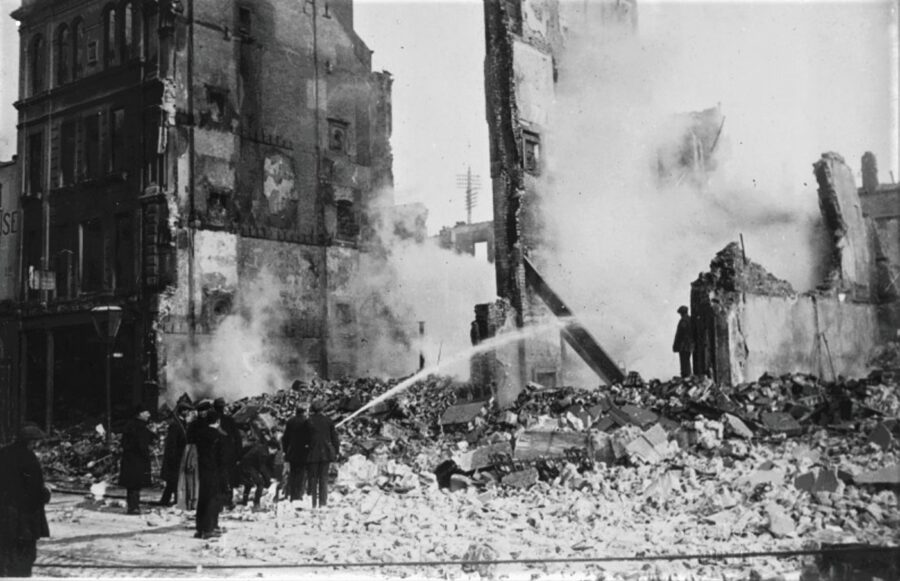
Kieran’s Our City, Our Town Article,
Cork Independent, 5 May 2022
Journeys to a Free State: A New Reconstruction Committee is Formed
The meeting between the Irish Provisional Government representative Diarmuid Fawsitt and the Cork Reconstruction Committee of Corporation of Cork had been long awaited. For over fifteen months since the Burning of Cork on 11-12 December 1920 there was a great desire to have the rebuilding proceeded with as rapidly as possible and for the lack of compensation forthcoming resolved.
As part of the Anglo-Irish agreement the principle of compensation was acknowledged for those who had suffered loss or injury of the kind governed by the enactments relating to Criminal Injuries. These included those sustained during action taken by the military operating under martial law between 21 January 1919 and 11 July 1921. Consequently, the Compensation (Ireland) Commission was established jointly by Westminster and Irish Provisional Governments respectively in early 1922.
On 2 May 1922 Diarmuid Fawsitt of the Ministry of Economy met with a recently formed Cork Reconstruction Committee, which replaced an inhouse members committee. The new committee would have local councillors but more specifically representatives of owners of buildings, a representative of the Provisional Government in the form of Cork’s Alderman Liam de Roiste TD. Dublin based Thomas Cullen was the government’s supervising architect whilst Mr Patrick Harnett McCarthy was the government’s representative engineer.
The Cork Examiner outlines the statement at the meeting by Diarmuid Fawsitt. He was glad to tell those present that one of the Provisional Government’s earliest efforts was to come to an understanding with the British government to set up a compensation commission. All the arrangements with the British government had been advanced. Its personnel would be announced in the days to follow.
Diarmuid noted of the re-opening of all cases and re-examining previous compensation awards; “They were all aware of the destruction wrought in that country by the armed forces of the British government, and they were also aware of the prejudiced manner in which the then representatives of justice approached the cases. In a number of cases, amounts altogether too large were awarded, while in others they were quite inadequate. The Compensation Commission would have to investigate all cases that were undefended, and machinery was also being set up whereby claims could be reopened with a view to revision. The cases that would stand or those in which defences were put up by local authorities”.
Diarmuid outlined that considering the magnitude of the task, the work of the commission would take some time. In view of the circumstances the Provisional Government thought it better to make arrangements so that decree holders could get the necessary financial assistance to start rebuilding immediately. Otherwise, the work of rebuilding could be delayed further, and decree holders may hesitate to start building it all.
The Provisional Government had prepared a scheme for general reconstruction work throughout the country. Decree holders would be facilitated to obtain government loans, and to enable them to build, particularly where trade and industry concerns were central. All claims for government loans in advance could be made to the secretary of the Office of Public Works. Diarmuid noted: “every claim would receive a sympathetic consideration and all the circumstances would be taken into recognition and the financial assistance requisite in the circumstances would be forthcoming but the government”.
As regards the Cork City situation, Diarmuid detailed it was felt by the Provisional Government that it demanded a special effort on their part to help reconstruction in the city. He was glad to say that it was largely because of the city’s civic spirit that the government intervened. He wished to give credit to the Corporation of Cork and the owners of destroyed properties for having set up the initial reconstruction committee, which had been functioning there for some time. The work of that committee was preparatory to the work of the committee they were setting up.
In the new scheme it would be provided that advances would be made by the government up to three-fifths of the actual decrees obtained in courts. In otherwords, if a claimant held a decree for £5000, the Provisional Government was prepared to advance, as the building, was being constructed the sum of £3000. It was provided that the sum of £10,000 be made available immediately to the Reconstruction Committee through the Corporation’s finance officer.
The Reconstruction Committee would then consider what they would require each month. And so on until one of two things occurred – either the actual decrees were made good to the decree holders by the compensation commission are the buildings were completed when there would be no longer a necessity or obligation on the provision government or to provide the loans.
All claimants would have to satisfy the community that they were actual decree holders. Applications for payments would have to come before the City’s Treasurer or finance officer and would subsequently have to come before the architect and engineer of the Provisional Government for certification. Then the City Treasurer, on the authority of the committee, acting on the certificate of the city solicitor an engineer, would make an advance to meet the actual expense of building.
The engineer and architect of the provisional government would have their services at the disposal of the committee when required. Diarmuid concluded by noting “they would like to see the new Cork excel the old Cork, and they look forward to the day when Cork and the Port of Cork would enjoy greater prosperity than they ever did in the past”.
Caption:
1149a. Ruins of Roches Stores department store, St Patrick’s Street, 12 December 1920 (source: Hogan Photography, National Library of Ireland).